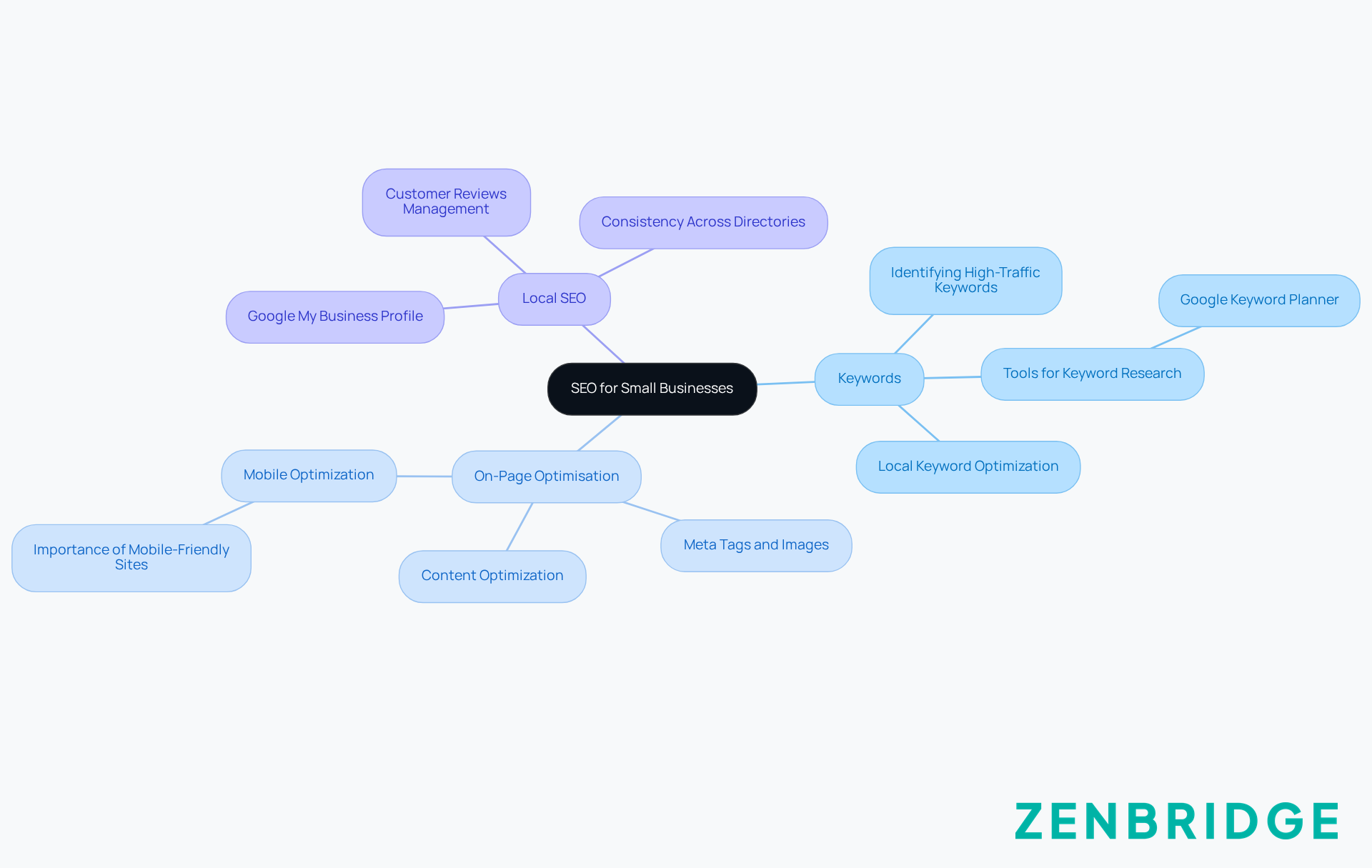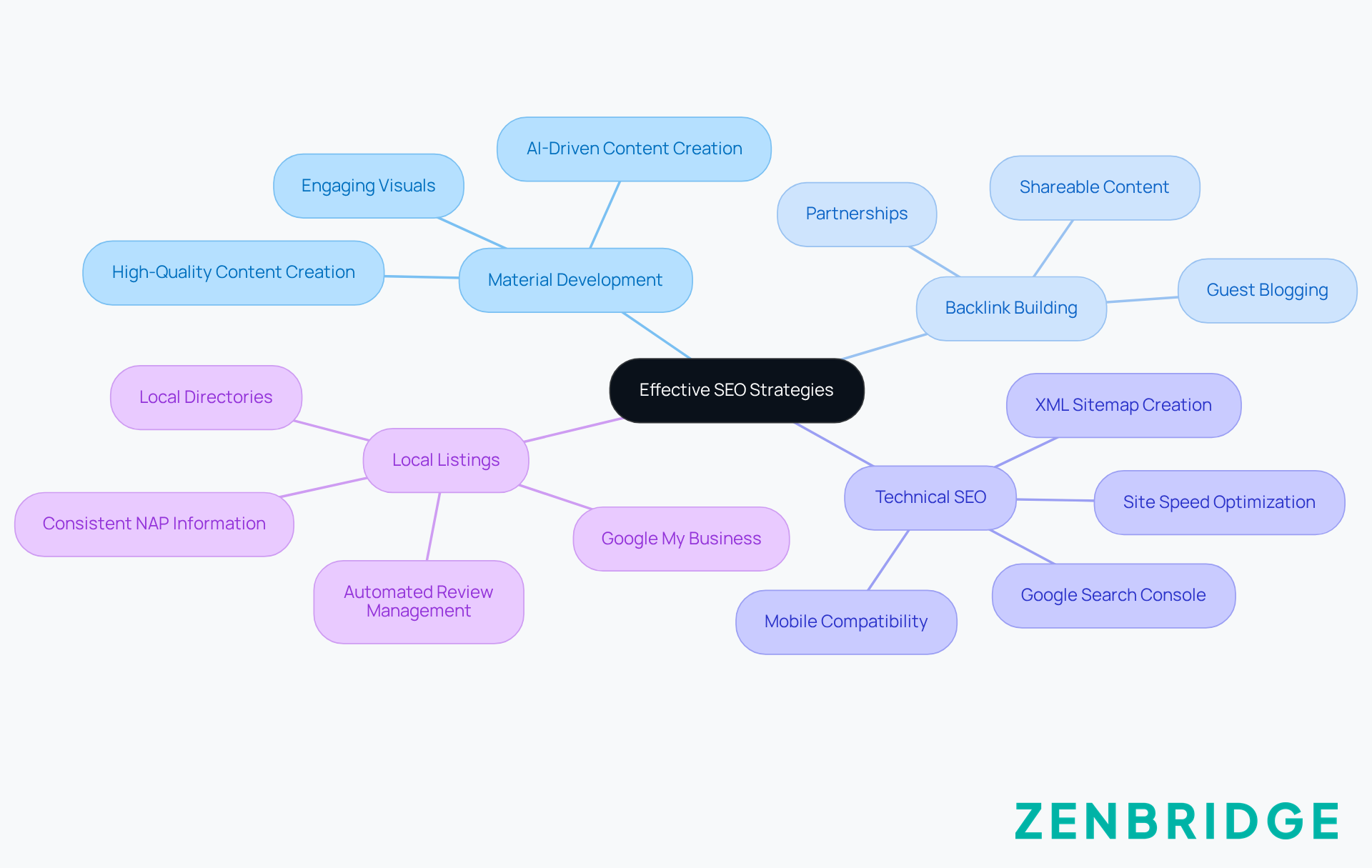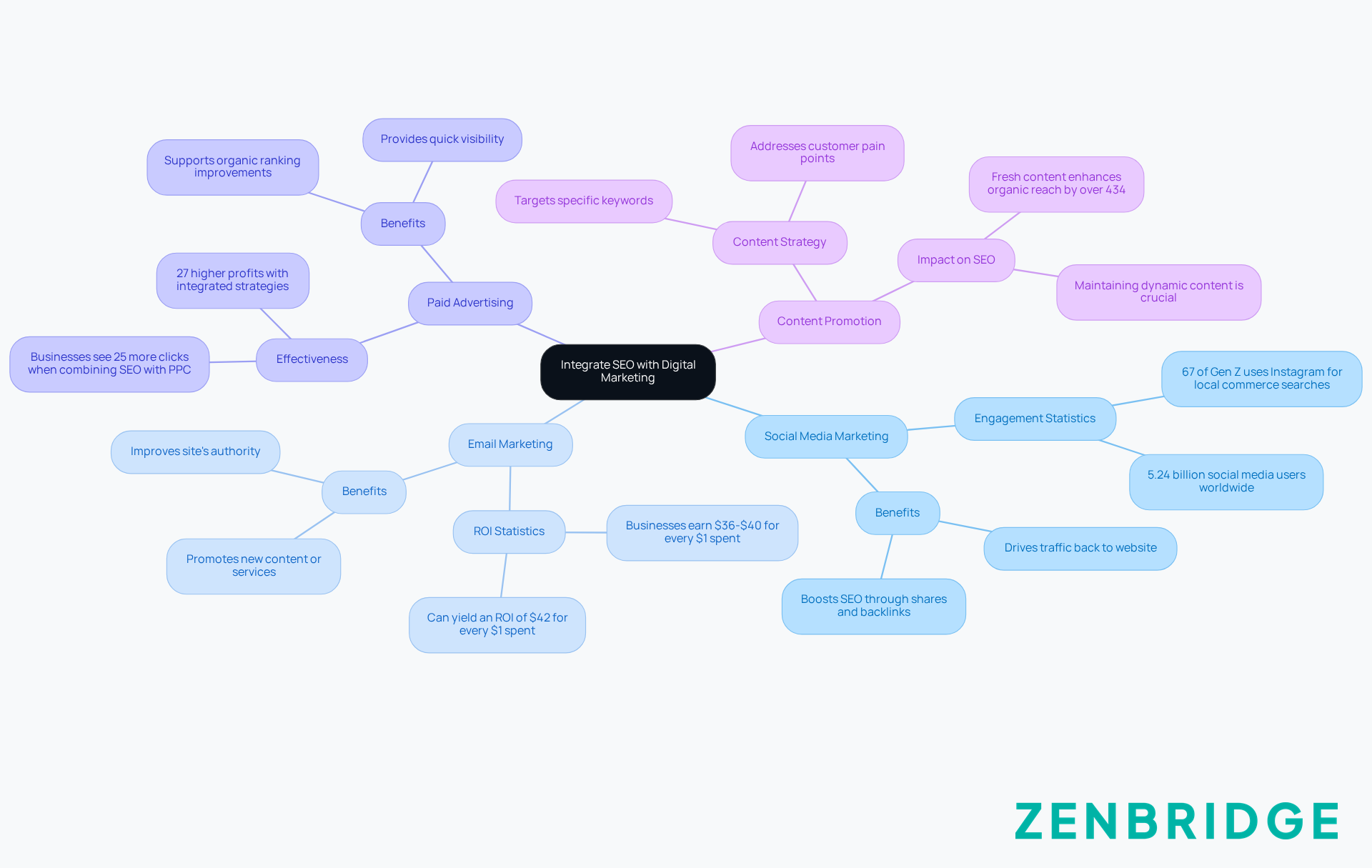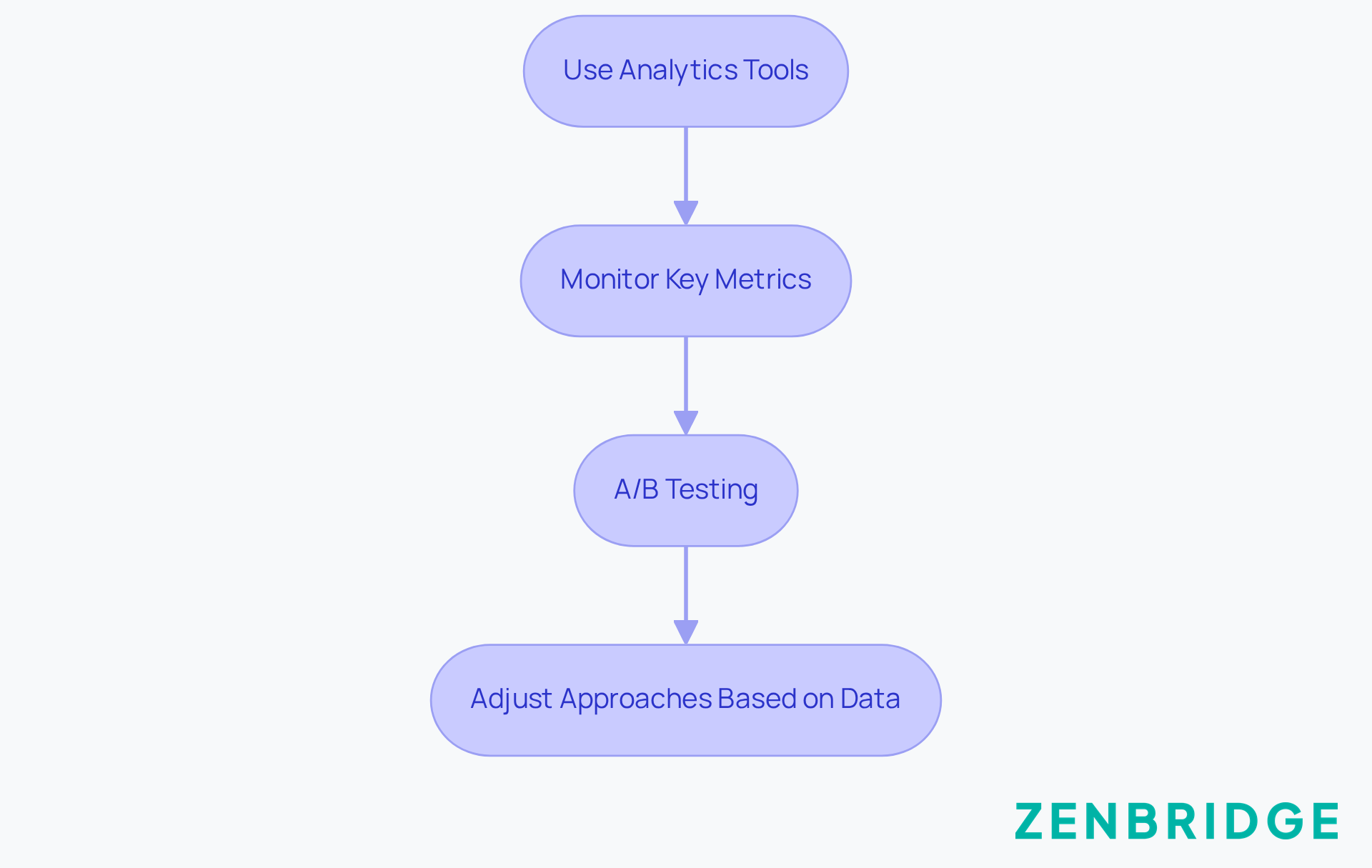
4 Key Practices for Digital SEO Marketing Success

Key Highlights:
- SEO is vital for small businesses to improve their visibility on search engines like Google.
- Identifying the right keywords is crucial; tools like Google Keyword Planner can assist in finding high-traffic keywords.
- On-page optimization involves using keywords naturally in website content, ensuring mobile-friendliness, and optimising meta tags.
- Local SEO is important for service-based businesses, requiring a well-managed Google My Business profile and consistent information across directories.
- ZenBridge's UpRank service can help businesses manage SEO tasks and improve visibility within 30-90 days.
- Effective SEO strategies include content development, backlink building, technical SEO, and maintaining local listings.
- Integrating SEO with social media, email marketing, and paid advertising can enhance overall digital marketing efforts.
- Regularly measuring SEO performance using tools like Google Analytics and A/B testing is essential for ongoing optimization.
Introduction
In today's digital world, small businesses are faced with the tough task of standing out among a sea of competitors. Mastering the basics of Search Engine Optimization (SEO) isn't just a nice-to-have; it's a must if you want to drive visibility and attract customers. So, let’s explore four key practises that can really boost your online presence—from getting a grip on keywords to blending SEO with your broader digital marketing strategies. You might be wondering, how can small businesses effectively navigate this complex landscape to not just survive but thrive in 2025 and beyond?
Understand the Fundamentals of SEO for Small Businesses
Search Engine Optimisation (SEO) is all about boosting your website's visibility on search engines like Google. For small businesses, understanding the basics of digital SEO marketing is crucial to compete in today’s digital world. Let’s break down some key components: understanding keywords, on-page optimisation, and the importance of local SEO.
-
Keywords: First off, you need to pinpoint the right keywords that potential customers are typing in when searching for your services. Tools like Google Keyword Planner can help you find those high-traffic keywords that match what you offer. Did you know that 61% of consumers turn to business information sites to learn about local businesses? That’s why optimising your keywords for local searches is a must.
-
On-Page Optimisation: Next up is on-page optimisation. Make sure your website’s content, meta tags, and images are all set up with your target keywords. This means using keywords naturally in your content and ensuring your site is mobile-friendly. With 59.16% of internet users worldwide browsing on mobile devices, having a mobile-optimised site is key to attracting eager customers.
-
Local SEO: Now, let’s talk about local SEO, especially for service-based businesses. This involves sprucing up your Google My Business profile, gathering customer reviews, and ensuring your info is consistent across online directories. With ZenBridge's UpRank service, you can expect to snag at least 15 new 5-star reviews and get at least one keyword in the Top-3 within 90 days—if you meet certain conditions. You’ll need to be servicing at least 30 clients a month, ask for SMS/phone reviews from every client you’ve worked with recently, and ensure you’re delivering top-notch customer service. Remember, 76% of folks searching on their smartphones for nearby places will visit a location within a day, so a strong local presence can really boost your sales.
-
Seamless Management: Lastly, ZenBridge's UpRank service takes a hands-off approach, managing all your SEO needs, from content to reviews to reporting. Most clients start seeing a bump in visibility and call volume within the first 30 days, with real momentum building over 60-90 days. By grasping these fundamentals and leveraging services like UpRank, small businesses can lay down a solid foundation for their digital SEO marketing efforts, which will lead to better online visibility and more customer engagement.

Implement Effective SEO Strategies to Boost Online Visibility
To boost your online visibility, small businesses really should take a multi-faceted approach to SEO. Let’s dive into some effective strategies that can make a difference:
-
Material Development: Consistently release high-quality, relevant materials that meet the needs and questions of your target audience. Not only does this help with SEO, but it also establishes your authority in your industry. With ZenBridge's UpRank service, you can automate your creation using AI-driven systems, ensuring consistency and relevance.
-
Backlink Building: Now, let’s talk about earning backlinks from reputable websites. You can achieve this through guest blogging, partnerships, and creating shareable content that others will want to link to.
-
Technical SEO: Make sure your website is technically sound. This includes optimising site speed, ensuring mobile compatibility, and creating an XML sitemap. Tools like Google Search Console can help you identify and fix any technical issues.
-
Local Listings: Beyond Google My Business, it’s essential to ensure your company is listed on relevant local directories and review platforms. Keeping consistent NAP (Name, Address, Phone Number) information across platforms is crucial for local SEO. ZenBridge's UpRank service can help manage your Google Business profile and automate reviews, enhancing your local presence with smart systems.
By applying these strategies, you can significantly improve your online presence, draw in more visitors, and ultimately turn leads into clients. And hey, why not think about getting your complimentary 60-second Google Business assessment from ZenBridge? It’s a great way to pinpoint areas for enhancement and unlock your potential!

Integrate SEO with Broader Digital Marketing Efforts for Maximum Impact
To achieve maximum impact, SEO shouldn't exist in isolation. So, let’s dive into some effective ways to integrate SEO with your broader digital marketing efforts:
-
Social Media Marketing: Actively share your content across social media platforms to drive traffic back to your website. Engaging posts can lead to shares and backlinks, really boosting your SEO efforts. Did you know that 67% of Gen Z uses Instagram for local commerce searches? Leveraging these platforms is crucial for visibility!
-
Email Marketing: Implement targeted email campaigns to promote new content or services. Including links to your website in your emails can drive traffic and improve your site's authority. Email marketing boasts an impressive ROI, with businesses earning $36-$40 for every $1 spent. In fact, it can yield an ROI of $42 for every $1 spent, emphasising its value in driving website traffic.
-
Paid Advertising: Now, let’s talk about using pay-per-click (PPC) advertising to complement your SEO efforts. This approach can give you quick visibility while your organic rankings improve. Businesses that combine SEO with PPC advertising see 25% more clicks and 27% higher profits. That really underscores the effectiveness of a multi-channel approach!
-
Content Promotion: Align your promotional strategies with your SEO objectives. Develop content that targets specific keywords and addresses customer pain points, ensuring it’s optimised for search engines. Keeping your content fresh can enhance organic reach by more than 434%! That just shows how important it is to maintain a dynamic approach.
By combining digital SEO marketing with these methods, companies can create a holistic strategy that boosts visibility, engagement, and conversion rates. But, be careful to avoid common pitfalls, like neglecting content quality or relying too much on paid ads without a solid SEO foundation. Just look at small businesses that have effectively combined these efforts to enhance their online presence. You know what I mean?

Measure and Optimize SEO Performance Using Analytics
To ensure your digital SEO marketing efforts are effective, it’s super important to regularly measure and optimise your performance. Let’s break down some key steps:
- Use Analytics Tools: First off, get on board with tools like Google Analytics and Google Search Console. They’ll help you track website traffic, user behaviour, and keyword performance. These insights? They’re gold for figuring out what’s working and what needs a little TLC.
- Monitor Key Metrics: Keep an eye on metrics like organic traffic, bounce rate, conversion rate, and keyword rankings. Regularly checking these will help you understand how your digital SEO marketing strategies are performing.
- A/B Testing: Now, here’s where the fun begins—experiment! Try out different approaches, like changing up your content formats or calls to action. A/B testing can reveal what really resonates with your audience, giving you valuable insights to boost your website’s performance.
- Adjust Approaches Based on Data: Don’t forget to use the data you gather to tweak your SEO methods. If some keywords aren’t pulling their weight, think about adjusting your content or targeting different keywords that might bring in better results.
By consistently measuring and optimising your digital SEO marketing performance, you can adapt to the ever-changing market and keep your strategies sharp over time. So, what do you think? Ready to dive in and make those adjustments?

Conclusion
Hey there! Understanding and implementing effective digital SEO marketing practises is super important for small businesses looking to boost their online presence and compete better. By getting the hang of the basics of SEO—like keyword research, on-page optimization, and local SEO strategies—businesses can really ramp up their visibility on search engines and draw in more customers.
So, let’s dive into some key strategies that can lead to SEO success!
- Creating high-quality content
- Building backlinks
- Ensuring technical SEO
- Keeping local listings consistent
Plus, when you integrate SEO with your broader digital marketing efforts—like social media, email marketing, and paid ads—you can really amplify your results and drive more traffic to your website. And don’t forget, regularly measuring and optimising your SEO performance with analytics tools is key to adapting your strategies and achieving ongoing success.
Here’s the deal: embracing these practises not only boosts your online visibility but also helps foster customer engagement and growth. Small businesses, it’s time to take action! Leverage the insights and tools available, like ZenBridge's UpRank service, to refine your SEO strategies and unlock your full potential in the digital marketplace. Got questions? Let’s chat about it!
Frequently Asked Questions
What is SEO and why is it important for small businesses?
SEO, or Search Engine Optimisation, is the process of boosting your website's visibility on search engines like Google. For small businesses, understanding SEO is crucial to compete effectively in the digital marketplace.
How can I identify the right keywords for my business?
You can pinpoint the right keywords by using tools like Google Keyword Planner to find high-traffic keywords that potential customers are searching for related to your services.
Why is local SEO important for small businesses?
Local SEO is important because it helps businesses appear in local search results. With a significant percentage of consumers looking for local business information, optimising for local searches can attract more customers.
What are the key components of on-page optimisation?
Key components of on-page optimisation include ensuring that your website's content, meta tags, and images are set up with your target keywords, and making sure your site is mobile-friendly.
How does mobile optimisation affect my website’s performance?
Mobile optimisation is essential because a large percentage of internet users browse on mobile devices. A mobile-friendly site helps attract and retain customers who are searching on their smartphones.
What strategies can I implement for effective local SEO?
Effective local SEO strategies include optimising your Google My Business profile, gathering customer reviews, and ensuring consistent information across online directories.
What can I expect from ZenBridge's UpRank service?
ZenBridge's UpRank service manages all your SEO needs, including content, reviews, and reporting. Clients typically see an increase in visibility and call volume within the first 30 days, with more significant results over 60-90 days.
What are the conditions to achieve results with ZenBridge's UpRank service?
To achieve results with UpRank, you need to be servicing at least 30 clients a month, actively ask for SMS or phone reviews from recent clients, and provide excellent customer service.

